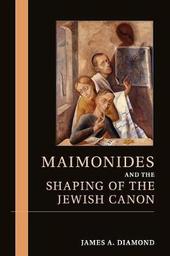
|
Maimonides and the Shaping of the Jewish Canon
Paperback / softback
Main Details
| Title |
Maimonides and the Shaping of the Jewish Canon
|
| Authors and Contributors |
By (author) James A. Diamond
|
| Physical Properties |
| Format:Paperback / softback | | Pages:328 | | Dimensions(mm): Height 230,Width 152 |
|
| Category/Genre | Judaism - life and practice
Judaism - sacred texts
Judaism - theology |
|---|
| ISBN/Barcode |
9781107636378
|
| Classifications | Dewey:296.181 |
|---|
| Audience | | Professional & Vocational | |
|---|
|
Publishing Details |
| Publisher |
Cambridge University Press
|
| Imprint |
Cambridge University Press
|
| Publication Date |
16 March 2017 |
| Publication Country |
United Kingdom
|
Description
Jewish thought since the Middle Ages can be regarded as a sustained dialogue with Moses Maimonides, regardless of the different social, cultural, and intellectual environments in which it was conducted. Much of Jewish intellectual history can be viewed as a series of engagements with him, fueled by the kind of 'Jewish' rabbinic and esoteric writing Maimonides practiced. This book examines a wide range of theologians, philosophers, and exegetes who share a passionate engagement with Maimonides, assaulting, adopting, subverting, or adapting his philosophical and jurisprudential thought. This ongoing enterprise is critical to any appreciation of the broader scope of Jewish law, philosophy, biblical interpretation, and Kabbalah. Maimonides's legal, philosophical, and exegetical corpus became canonical in the sense that many subsequent Jewish thinkers were compelled to struggle with it in order to advance their own thought. As such, Maimonides joins fundamental Jewish canon alongside the Bible, the Talmud, and the Zohar.
Author Biography
James A. Diamond holds an endowed chair in Jewish Studies at the University of Waterloo, Ontario. He is a leading authority on medieval Jewish thought and philosophy, and his studies have been published widely in all the prominent journals in the fields of Jewish studies, religious studies, and philosophy. His previous two books each garnered the Canadian Jewish Book Award for best scholarly book in the field of Jewish studies, and his last book on Maimonides and the Outsider was chosen in 2008 as a Notable Selection by the Jordan Schnitzer Book Awards in the Category of Philosophy and Jewish Thought for best book in the previous four years.
Reviews'James A. Diamond's book is a wonderfully rich, subtle, and erudite exposition of Maimonides' central and complex place in the history of Jewish thought. In his emphasis on Maimonides as an interpreter of prior canonical texts and in his analysis of the complex and deep ways in which Maimonides' own works became, in turn canonical, Diamond makes a highly important and remarkable contribution to understanding Jewish thought as essentially an interpretative tradition.' Moshe Halbertal, New York University School of Law, Hebrew University of Jerusalem, and author of Maimonides: Life and Thought 'A fascinating consideration of Judaism's most important thinker and the battles that have been fought over his ideas in the centuries following his death. Diamond's study begins with a sustained look at Maimonides himself and the central place that the love of God occupied in his view of Judaism. From there the book goes on to consider various understandings, and misunderstandings, of the master by a series of later thinkers, from Nahmanides and Abarbanel to such diverse moderns as Hermann Cohen, the Netziv, and Abraham Isaac Kook. This book is an intellectual tour de force, but more than that, it is an essential guide to understanding the 'thinking' part of Judaism in our own day.' James Kugel, Harvard University, Massachusetts 'In this uncommonly stimulating and deeply learned book, James A. Diamond has captured not only the development of a particular tradition within Judaism but also the excitement of tradition generally. His account of the extraordinary afterlife of Maimonides, this saga of assents and dissents through the centuries, establishes the primacy, and the originality, and the beauty of interpretation as a mode of thought. This study of the sustenance of ideas is itself intellectually sustaining; it is itself a link in the chain that it skillfully portrays.' Leon Wieseltier '... exemplifies a relatively new field of study ... [This] book will be of major interest to academics, but any Jew who studies and struggles with Maimonides' thought will find it a compelling read ... sure to be studied seriously around the world.' Martin Lockshin, The Canadian Jewish News
|